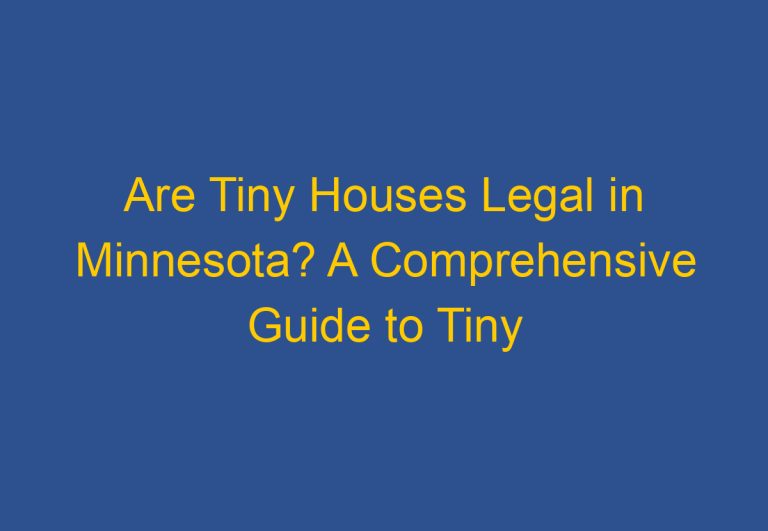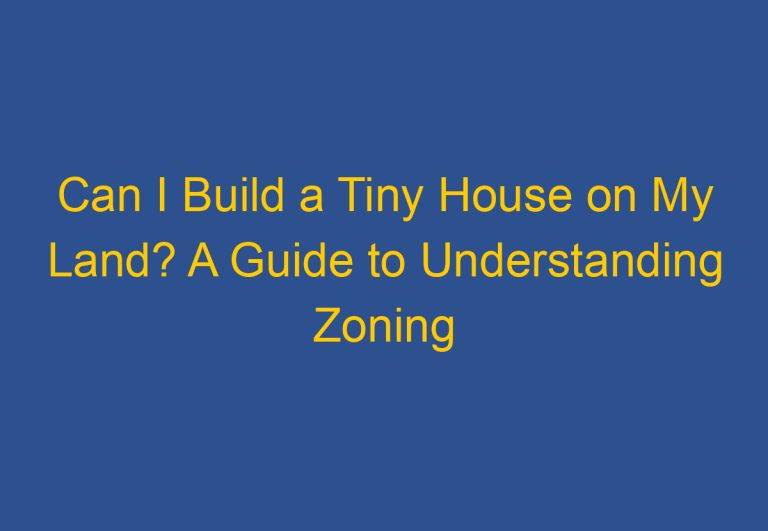Are Tiny Houses Legal in NH? Exploring Regulations and Zoning Laws
Tiny houses have been gaining popularity in recent years as a unique and affordable way to live. However, before investing in a tiny home, it is important to understand the legal requirements and regulations in the state where you plan to reside. In New Hampshire, tiny houses are legal, but there are certain regulations and requirements that must be met.
According to the International Building Code (IBC) being followed in New Hampshire, all tiny homes, except lofts, must have a net floor space of at least 120 square feet. Additionally, a tiny house in New Hampshire must have a ceiling height of not less than 6 feet 8 inches in habitable spaces and hallways, while bathrooms, toilet rooms, and kitchens must have a ceiling height of not less than 6 feet 4 inches. It is important to note that tiny homes on wheels are considered recreational vehicles and are not allowed for year-round stay in New Hampshire.
Before embarking on a tiny house journey in New Hampshire, it is recommended to research the certification for tiny homes in the specific county where you plan to reside. Each county has specific requirements and zoning laws that must be met. It is also important to ensure that the tiny home meets the same energy efficiency standards as traditional homes in the state. By understanding the legal requirements and regulations for tiny homes in New Hampshire, individuals can make informed decisions about whether a tiny home is the right choice for them.
Legality and Zoning of Tiny Houses in New Hampshire
State and Municipal Zoning Laws
In New Hampshire, tiny houses are considered to be accessory dwelling units (ADUs) and are subject to state and municipal zoning laws. The state has passed a law to allow ADUs, and some municipalities in New Hampshire consider tiny houses to be ADUs. However, each county has specific requirements and zoning laws, so it is important to research the certification for tiny homes in the specific county where you plan to reside. Understanding the rules and regulations will help ensure a smooth and legal process as you pursue your tiny house dream.
Building Codes and Standards for Tiny Houses
In New Hampshire, several building laws and zoning regulations must be adhered to when constructing and living in a tiny house. The International Building Code (IBC) is a comprehensive set of building standards that many states, including New Hampshire, have adopted. The version currently in use in New Hampshire is the 2015 edition of the IBC. The IBC does not consider tiny houses, but New Hampshire has been following this version of the code. For tiny houses considered accessory dwelling units, you can build your tiny house in zoning districts where single-family dwellings are allowed.
Certification and Inspection Requirements
Certification and inspection requirements for tiny houses in New Hampshire vary depending on whether the house is on a foundation or on wheels. For tiny houses on wheels, they are typically considered recreational vehicles and are subject to certification and inspection requirements by the Department of Safety. On the other hand, if a tiny house is on a foundation, it must comply with the state and municipal building codes and regulations, including RSA 674 and the state building code. Detached accessory dwelling units must also meet minimum square footage requirements and obtain approval from the local zoning board of adjustment.
In summary, tiny houses are legal in New Hampshire, but they are subject to state and municipal zoning laws, as well as building codes and standards. It is important to research the certification and inspection requirements for your specific county and type of tiny house to ensure a smooth and legal process.
Ownership and Living in Tiny Houses
Affordability and Tax Implications
One of the main reasons why people choose to live in tiny houses is affordability. Tiny homes are generally less expensive to build or buy compared to traditional homes. Additionally, they require less maintenance and have lower utility bills due to their smaller size.
When it comes to taxes, tiny house owners may be subject to property taxes just like owners of traditional homes. However, the amount of taxes owed may be lower due to the smaller size of the tiny house. It’s important to check with local authorities to understand the tax implications of owning a tiny house in a particular area.
Safety, Utilities, and Energy Efficiency
Safety is a top priority for any homeowner, and tiny house owners are no exception. Tiny houses must comply with building codes and safety regulations just like traditional homes. It’s important to work with a reputable builder who understands the codes and regulations in the area.
Utilities and energy efficiency are also important considerations for tiny house owners. Many tiny houses are designed to be eco-friendly and energy-efficient, utilizing solar panels, composting toilets, and other sustainable features. However, it’s important to ensure that the tiny house has access to electricity, water, and sewage systems.
Community Impact and Housing Solutions
Tiny houses can provide a solution to the housing shortage in many areas, particularly for workforce housing and affordable rental units. They can also be a great option for seniors who want to downsize and simplify their lives.
However, it’s important to consider the impact of tiny houses on the community. Some areas may not allow tiny houses, or may only allow them as accessory dwelling units (ADUs) on residential properties. It’s important to check with local authorities to understand the regulations in the area.
Overall, owning and living in a tiny house can be a great option for those who want to embrace a minimalist lifestyle and reduce their environmental impact. However, it’s important to carefully consider the implications of owning a tiny house, including safety, utilities, and community impact. Working with a reputable builder and understanding local regulations can help ensure a successful transition to tiny house living.
Frequently Asked Questions
What are the zoning regulations for tiny houses in New Hampshire?
Zoning regulations for tiny houses vary by town in New Hampshire. Some towns have specific ordinances that allow for tiny house living, while others may have stricter regulations. It is important to research the zoning regulations in the specific town where you plan to live in a tiny house.
Which towns in New Hampshire have ordinances supporting tiny house living?
As of 2024, there are no towns in New Hampshire that have specific ordinances supporting tiny house living. However, some towns may allow for tiny houses under certain conditions. It is important to research the zoning regulations in the specific town where you plan to live in a tiny house.
Are there specific building codes for tiny homes in New Hampshire?
New Hampshire follows version 2015 of the International Building Code, which does not specifically address tiny houses. However, tiny houses must still meet the same energy efficiency standards as traditional homes. Additionally, tiny houses must have an egress roof access window that satisfies Section R310.2’s standards for rescue operations and is built and installed for emergency escape. In a tiny house, the ceiling height in livable areas and passageways must be at least 6 feet 8 inches.
Can I legally place a tiny house on my property in New Hampshire?
Yes, you can legally place a tiny house on your property in New Hampshire. However, it is important to research the zoning regulations in the specific town where you plan to place the tiny house. Additionally, the tiny house must meet the same building codes and energy efficiency standards as traditional homes.
What is the process for legally establishing a tiny home in New Hampshire?
The process for legally establishing a tiny home in New Hampshire varies by town. It is important to research the zoning regulations and building codes in the specific town where you plan to establish the tiny home. Additionally, you may need to obtain permits and inspections before establishing the tiny home.
How does House Bill 588 impact tiny house regulations in New Hampshire?
House Bill 588, which was signed into law in 2021, allows for accessory dwelling units (ADUs) to be built on residential properties in New Hampshire. This includes tiny houses that meet the requirements for ADUs. However, it is important to research the zoning regulations and building codes in the specific town where you plan to establish the tiny house. Additionally, you may need to obtain permits and inspections before establishing the tiny house.










